Pickpocketing Hotspots in The UK: Where in The UK Are Pickpockets Most Prevalent?

Ever had that sinking feeling when you reach for your wallet, and it’s gone? Pickpockets are experts at making that happen—disappearing with your belongings before you even realise. Whether it’s a quick bump in a crowded market or a casual brush on the Tube, these thieves know exactly how to work the crowd.
But don’t worry, the UK isn’t crawling with pickpockets at every corner. Thanks to SIA-trained security personnel, many places are well protected.
Curious about where pickpocketing happens the most in the UK?
In this report, we’ll dive into the areas where pickpocketing in the UK is most common and highlight the regions that have seen the biggest shifts in theft from the person incidents. Ready to find out where to keep your guard up? Let’s dive in!
Top Pickpocketing Hotspots in the UK
Some places in the UK, especially London, are prime targets for pickpocketing due to the high number of tourists and busy crowds. Here’s a look at the top pickpocketing hotspots:
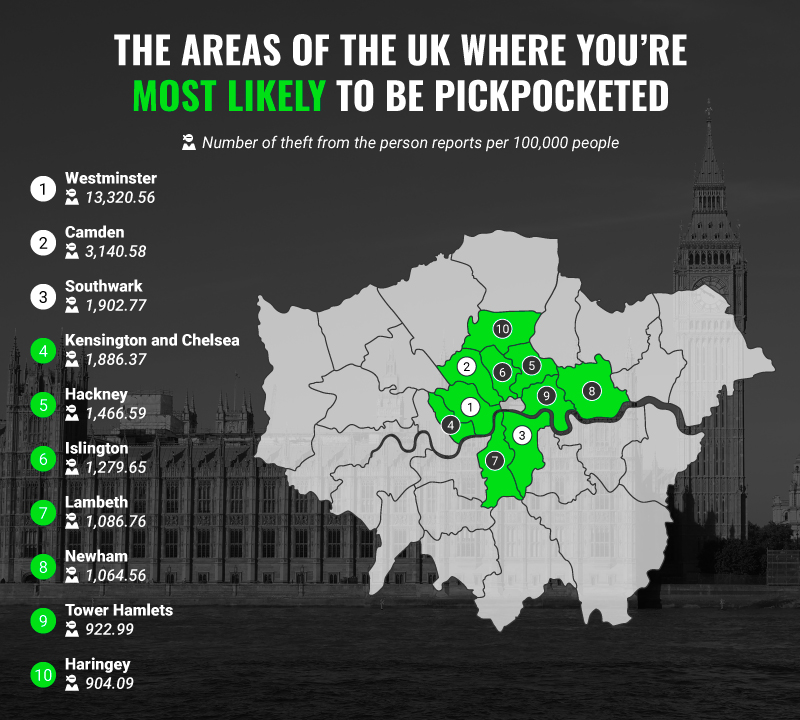
Westminster – 13,320 reports per 100,000 people
It’s no surprise that Westminster is at the top of the list. Home to iconic landmarks like Buckingham Palace, Trafalgar Square, and the Houses of Parliament, this area attracts millions of tourists each year. Unfortunately, it also attracts a large number of pickpockets. From March 2023 to March 2024, there were 28,155 reported incidents of theft from the person, which is over 13,320 cases per 100,000 people!
If you plan to visit, make sure to follow smart strategies to navigate London safely and avoid becoming a target for pickpockets.
Camden – 3,141 reports per 100,000 people
Camden is famous for its lively market and nightlife, which makes it a hotspot for both locals and tourists. But with its bustling streets come increased opportunities for pickpocketing. Last year, 6,848 incidents were reported, translating to 3,141 thefts per 100,000 people. It’s clear that Camden is a place where visitors need to be extra cautious.
Southwark – 1,903 reports per 100,000 people
Another London borough with high levels of street theft is Southwark. Known for popular attractions like London Bridge, The Shard, and Shakespeare’s Globe Theatre, Southwark saw 5,935 pickpocketing incidents last year, or about 1,903 reports per 100,000 people.
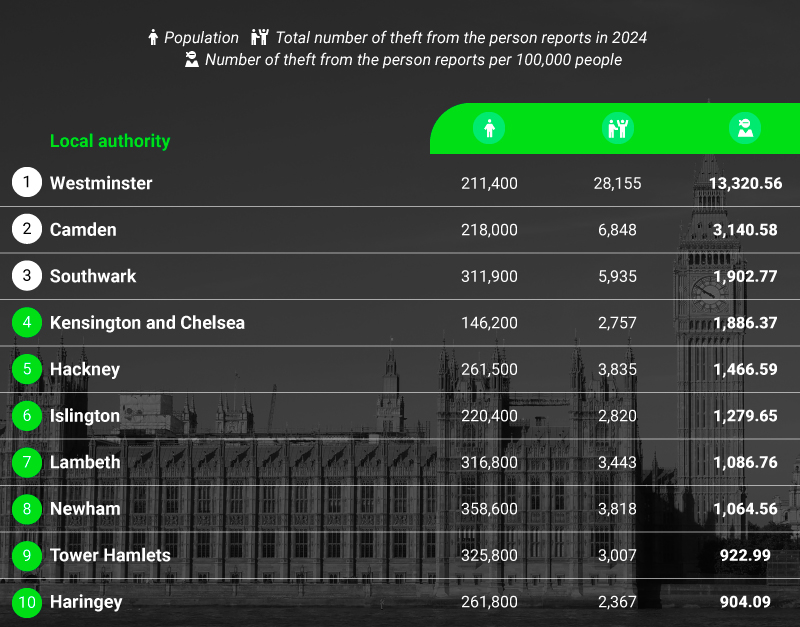
Safest Areas in the UK with Low Pickpocketing Incidents
Thankfully, not all areas in the UK are rife with pickpocketing. Some regions report very low numbers of theft, making them much safer for locals and tourists alike.
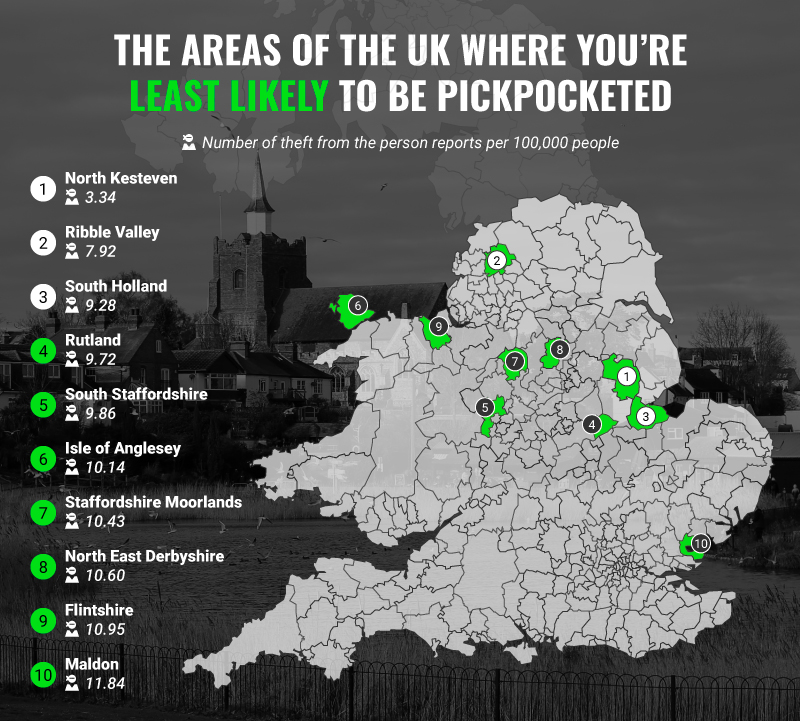
North Kesteven – 3.34 reports per 100,000 people
If you’re looking for a safe spot in the UK, head to North Kesteven in Lincolnshire. This largely rural area had only four incidents of pickpocketing in the last year, equating to just 3.34 reports per 100,000 people. The quiet towns of Sleaford and North Hykeham don’t offer many opportunities for thieves.
Ribble Valley – 7.92 reports per 100,000 people
Located in Lancashire, the peaceful Ribble Valley had just five reported incidents last year, with 7.92 reports per 100,000 people. The towns of Clitheroe, Chipping, and Ribchester don’t see much activity from pickpockets.
South Holland – 9.28 reports per 100,000 people
Another quiet spot is South Holland in Lincolnshire, with just nine reported cases of theft from the person in the past year. That’s 9.28 reports per 100,000 people, showing that while South Holland may not be immune to pickpockets, it’s still much safer than busier areas like London.
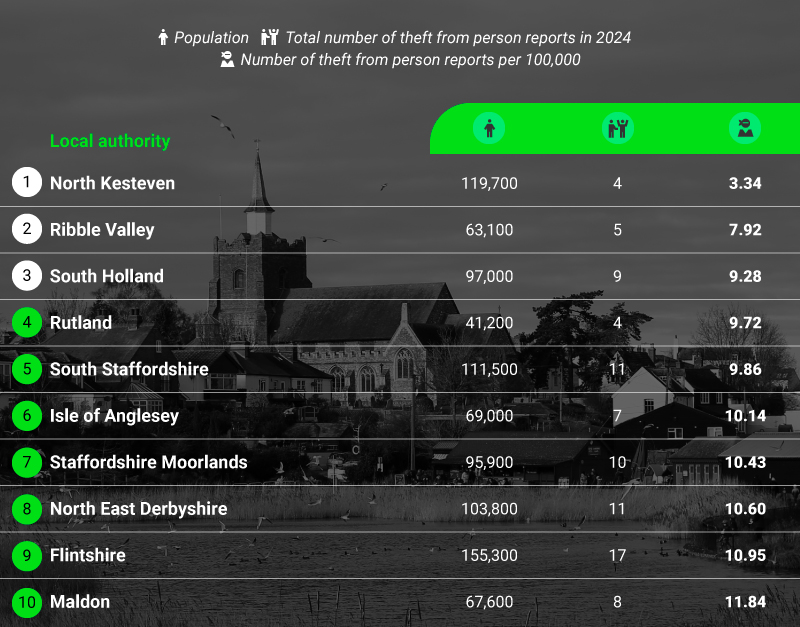
Areas with the Biggest Increase in Pickpocketing in the UK
Some places in the UK have seen sharp rises in pickpocketing incidents over the last three years. These areas are seeing more theft from the person as visitor numbers grow.
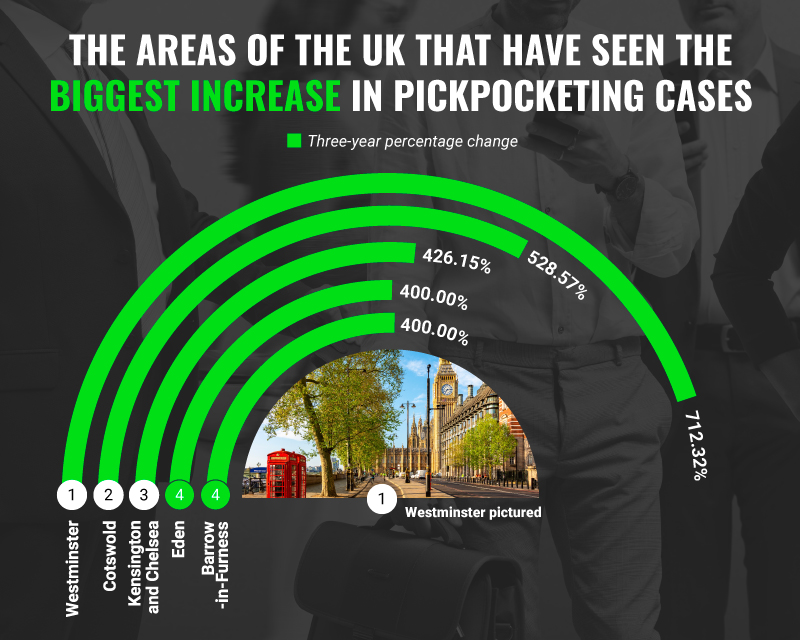
Westminster – 712% increase
As if being the top pickpocketing hotspot in the UK wasn’t enough, Westminster has also seen a staggering 712% increase in thefts over the last three years. In 2021, there were just 3,466 reports of pickpocketing, but by 2024, that number had jumped to 28,155. Popular tourist areas like Covent Garden, Soho, and Mayfair are hotspots for this kind of crime.
Cotswold – 529% increase
Even in the scenic and quiet Cotswolds, pickpocketing incidents are on the rise. The number of thefts grew from 7 to 44 over the last three years, marking a 529% increase. While it’s still rare, it’s important for tourists to stay cautious even in smaller, quieter areas.
Kensington and Chelsea – 426% increase
This royal borough, known for its affluent residents and high-end shops, has also seen a significant 426% rise in pickpocketing cases. In 2021, 524 reports were filed, but by 2024, the number had climbed to 2,757 incidents. With hotspots like Kensington High Street, it’s no wonder pickpockets are attracted to the area.
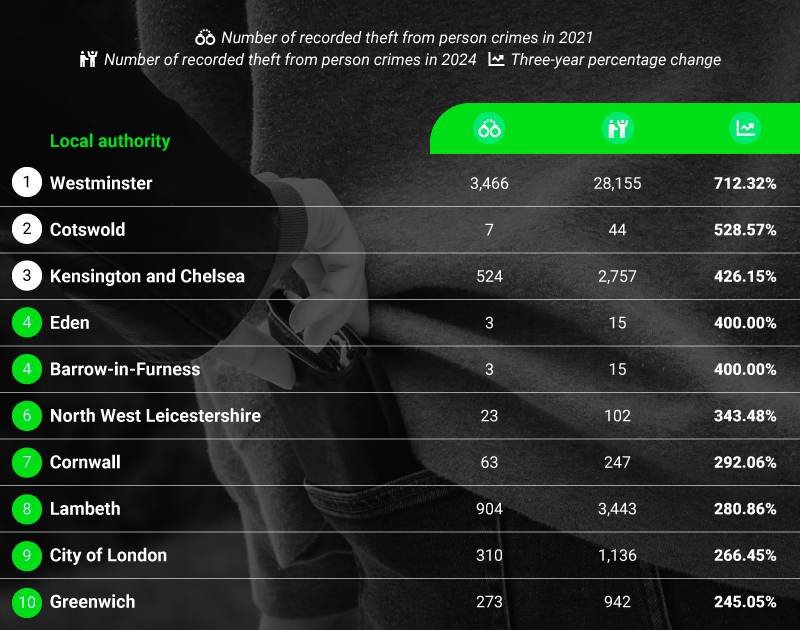
Areas with the Biggest Drop in Pickpocketing in the UK
Not all regions are experiencing a rise in pickpocketing. Some areas have seen a significant decline in theft, likely thanks to improved security and awareness.
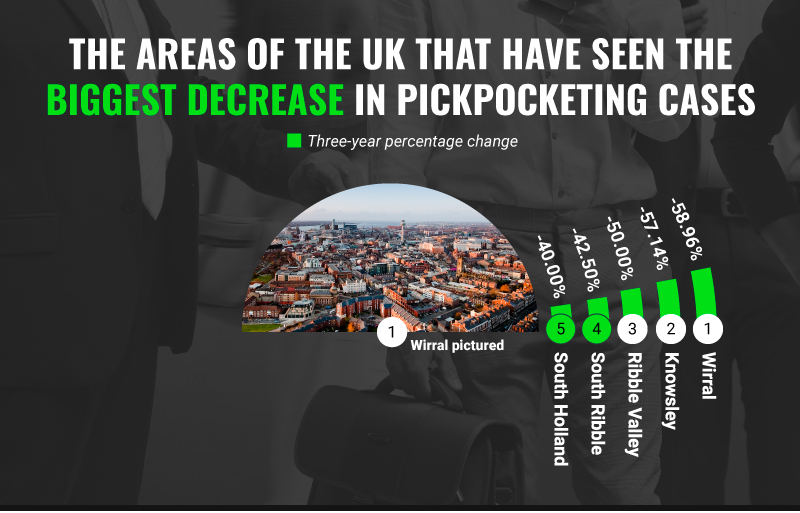
Wirral – 59% decrease
The Wirral area, home to towns like Birkenhead and Wallasey, has seen a 59% drop in pickpocketing incidents over the last three years. The number of reported cases fell from 134 in 2021 to just 55 in 2024.
Knowsley – 57% decrease
Over in Knowsley, near Liverpool, the number of pickpocketing reports dropped from 56 in 2021 to 24 in 2024, showing a 57% decrease. Major towns like Kirkby, Prescot, and Huyton are seeing fewer thefts thanks to better security measures.
Ribble Valley – 50% decrease
We already know that Ribble Valley has one of the lowest rates of pickpocketing in the UK, but it has also experienced a 50% drop in incidents. In 2021, there were 10 reports of theft, but by 2024, that number had halved to just five.
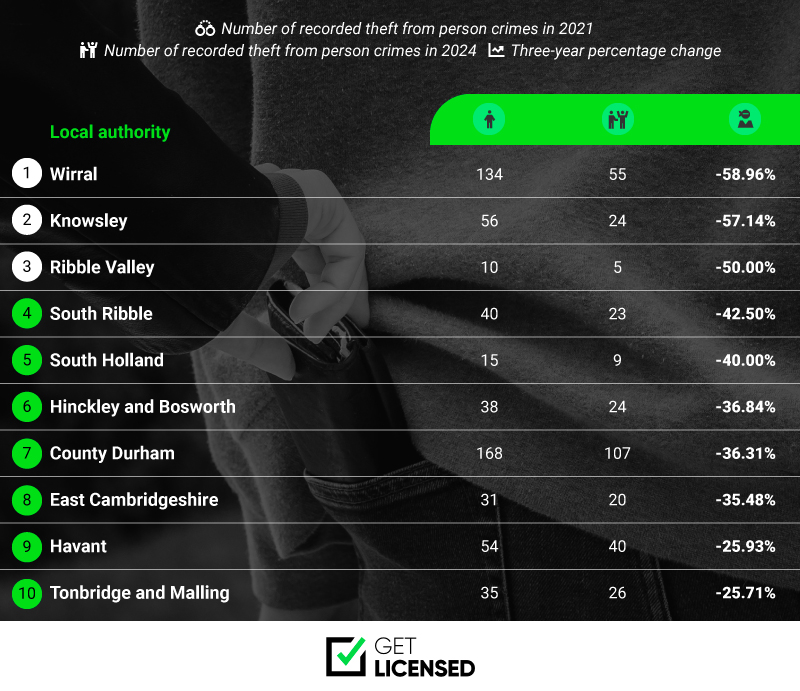
How to Protect Yourself from Pickpockets in the UK
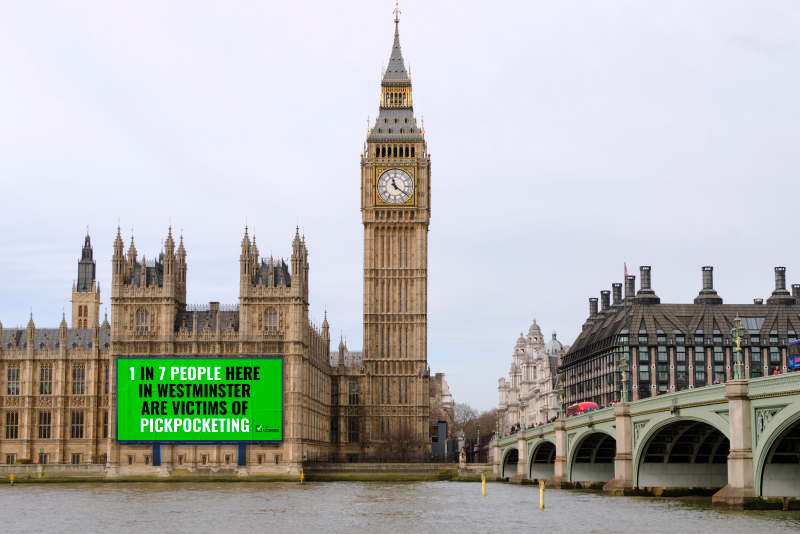
With 347,000 incidents of theft from the person reported across the UK last year—a 40% increase from 2023—it’s important to take steps to protect yourself from pickpockets. Here’s how:
-
Keep Your Bag Secure
-
Don’t Flash Your Phone
-
Watch Where You Place Your Belongings
-
Carry Less Cash
-
Stay Alert in Crowds
Always use a bag with zips and keep it closed. A crossbody bag is a better option than a shoulder bag, making it harder for someone to grab. If you’re carrying a backpack, keep it in front of you in crowded areas.
Pickpockets love smartphones, especially when they’re left in back pockets or in plain sight. Avoid using your phone in crowded places unless necessary.
Don’t leave your wallet, phone, or bag unattended in cafés or restaurants. Keep your bag on your lap or near your feet rather than hanging it on the back of a chair.
Try not to carry large amounts of cash. If you need cash, keep it in a zipped compartment or a secure bag.
Crowded places like train stations, shopping centres, and tourist spots are perfect for pickpockets. Be aware of your surroundings, and don’t get distracted by sudden bumps or someone dropping something nearby.
For more tips on avoiding theft in high-traffic areas, check out our guide to preventing pickpocketing in busy urban areas.
How Get Licensed Helps Combat Pickpocketing in the UK
It’s not just by chance that many public spaces in the UK are protected from pickpocketing incidents. Behind the scenes, thousands of SIA-licensed security professionals are trained to prevent theft and safeguard people in crowded areas where pickpockets often strike. These security experts, many of whom receive training through Get Licensed, play a crucial role in reducing the number of pickpocketing and theft from the person cases across the country.
At Get Licensed, we offer a range of security training courses, including the popular Door Supervisor Course and the CCTV Operator Course. These courses equip individuals with the skills to handle public safety, manage crowds, and operate surveillance equipment—key tools in identifying suspicious behaviour and preventing crimes like pickpocketing. In fact, CCTV operators play a vital role in observing crowded places such as train stations and shopping centres, making it more difficult for pickpockets to go unnoticed.

Final Thoughts
Pickpocketing may be on the rise in some UK areas, but with a few simple precautions, you can reduce your chances of being targeted. Whether you’re exploring the busy streets of Westminster or enjoying a quiet day in the Cotswolds, staying aware and keeping your belongings secure can help keep you safe.
For a broader view of crime trends in the UK, including theft and other crime types, check out our UK Crime Report 2024 for detailed insights into the changing landscape of crime across the nation.
Methodology:
All data used was sourced from the March 2021 and March 2024 ‘Recorded crime data by Community Safety Partnership area’ datasets from ONS Crime Data.
Launch your career as a
Security Guard in the UK
Learn how to start your career in UK security industry.
Explore Courses

 Trustpilot
Trustpilot































